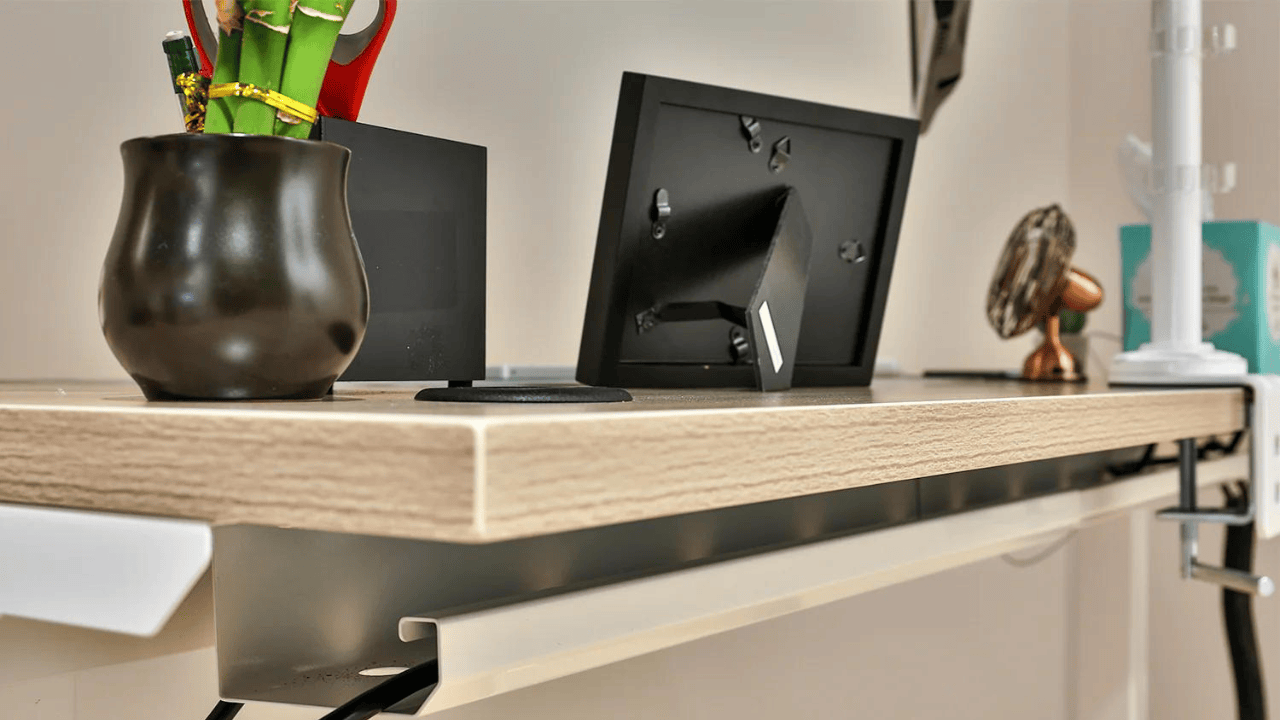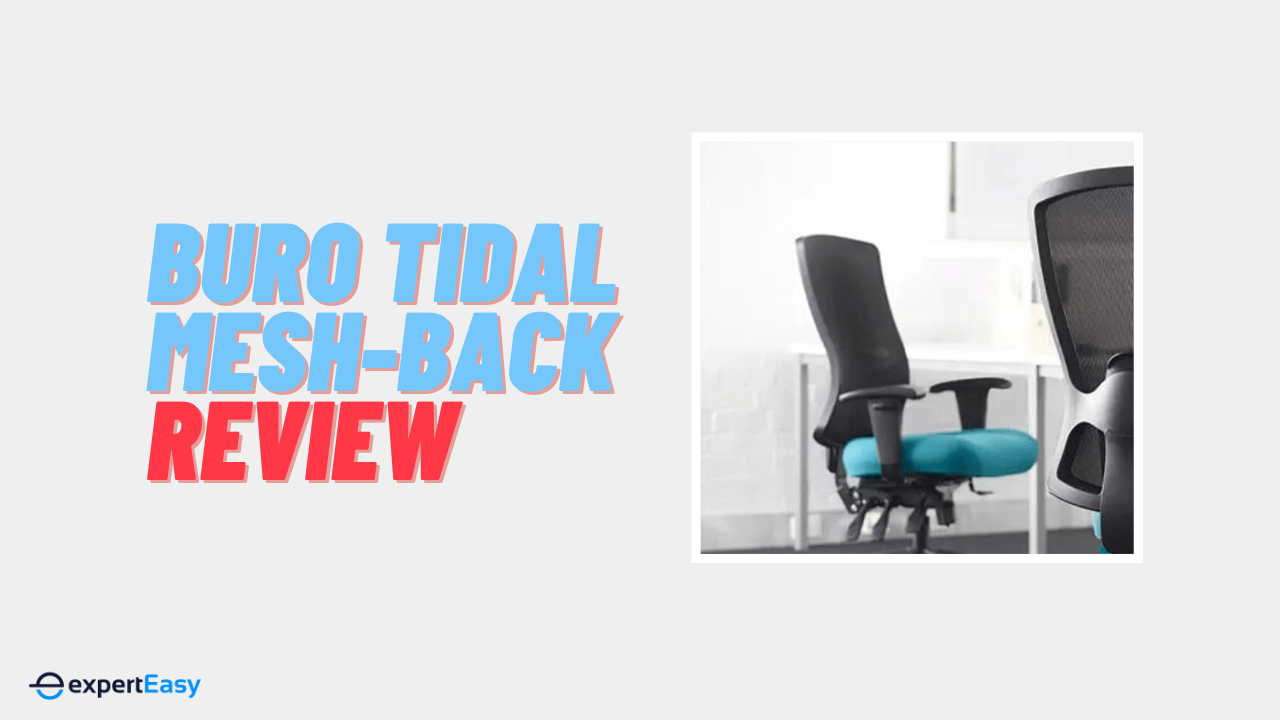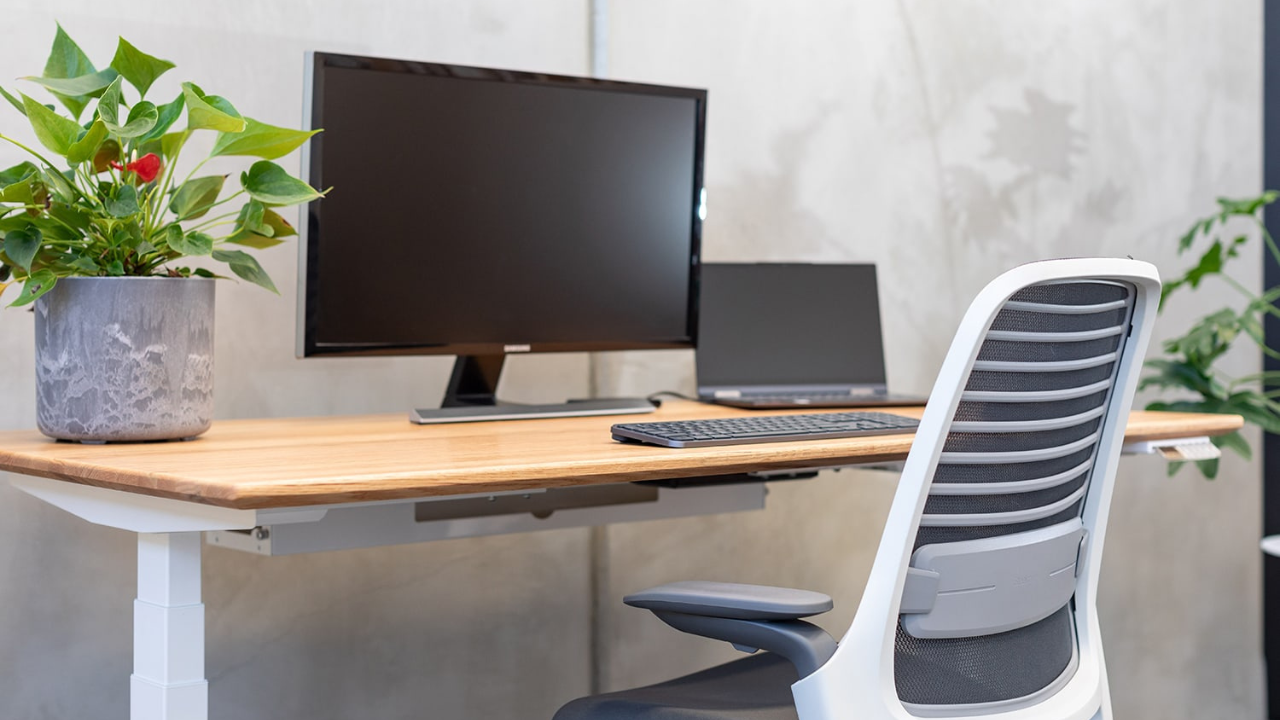Are you tired of the mess of cables under your sit-stand desk? Keeping your workspace tidy can be challenging, especially if you have limited desk space with multiple monitors and accessories.
In this blog, I’ll share eight practical tips to help you manage those cables and keep your desk neat. Maintaining a clutter-free workspace improves your productivity and focus and reduces stress.
#1 - Optimise the desk position

The first and most crucial step in cable management is optimising your sit-stand desk position from its power source. Keeping your desk close to the power socket makes all other tips easier. For example, you can use shorter cables, which means fewer long, messy wires or cables hanging around.
Shorter cables are also simpler to bundle and route along the desk's edges or underside. Plus, they are less likely to get tangled or damaged when you adjust the height of your sit-stand desk.
Similarly, having the power socket nearby makes plugging and unplugging your devices easier. You won't have to stretch cables across the room, which can be a tripping hazard. This keeps your workspace safer.
#2 - Use monitor stands or arms
Mounting your monitor on a monitor stand or arm frees up a lot of space on your desk. This extra space makes it easier to organise and hide cables. High-end monitor arms often have built-in cable management systems, such as clips or channels, to route cables. So, when you move your monitor, the cables move with it in a controlled manner.
In addition, having your monitor lifted off the desk surface means you can run cables behind the monitor and down the arm rather than across your desk. This approach also keeps your workspace more organised, improves the desk ergonomics, and makes cleaning easier.
#3 - Invest in a cable tray

A cable management tray makes a big difference in managing cables for your sit-stand desk. It’s a simple accessory that attaches to the underside of your desk and provides a dedicated space to hold all your cables.
Cable trays keep your cables off the floor and out of sight, preventing the messy tangle of wires that can make your workspace look cluttered. Properly organised and well-secured cables in a tray are less likely to get damaged or accidentally unplugged when you adjust the height of your sit-stand desk.
Most sit-stand desks include a cable tray on purchase, but if yours doesn’t, then it should be the first accessory on your list.
#4 - Use velcro and cable ties
Alongside cable trays are velcros and cable ties. These handy tools help you bundle and secure your cables to organise your workspace.
Here’s how to use them:
- Velcro ties are reusable and adjustable, which makes them great for managing cables that you might need to move or change frequently. Wrap velcro ties around group of wires to keep them together.
- Cable ties, also known as zip ties, are stronger and more permanent. Once you secure a group of cables with a cable tie, they stay in place. The accessory is ideal for wires that move infrequently.
Use Velcro and cable ties to route cables. This way, you reduce the risk of tripping over cables or accidentally unplugging something. Velcro and cable ties are simple but very effective tools.
#5 - Use underdesk storage

Not all your sit-stand desk accessories deserve space on your desk. Move gadgets like power strips, USB hubs, and small routers underneath your desk. This approach frees up valuable space for essential items.
Additionally, mounting accessories underneath your standing desk improves cable routing to your devices. This reduces the risk of them getting tangled or accidentally unplugged. Plus, it allows you to bundle and secure cables more effectively with cable ties and Velcro straps.
#6 - Manage strays and loose cables
Strays and loose cables are often inevitable. They create a messy and tangled appearance, making it harder to find the cables you need and increasing the risk of tripping or accidentally unplugging something.
Here’s how to manage them:
- Use cable clips or hooks to manage strays, keep them neatly in place, and prevent them from hanging loosely.
- Bundle your loose cables with cable sleeves to reduce clutter wear and tear, and manage them as a single unit.
- You can use Velcro and cable ties to bundle cables together and secure them to the legs or underside of your desk.
- Where extreme, use cable raceways to conceal and organise multiple cables and protect them from damage.
Managing stray and loose cables is essential for an organised and safe workspace. These hand-picked tips will improve your workspace's efficiency and enhance your sit-stand desk experience.
#7 - Colour code and label cables

When you colour code your cables, you assign a specific colour to each type of cable or device. For example, you can use red for power cables, blue for USB cables, and green for audio cables. This way, you don’t have to trace cables back to their source, which is time-consuming and confusing.
Colour codes and labels also reduce the visual clutter around your desk. It makes regular maintenance of your cables, such as checking for wear and tear or ensuring connections are secure, easier. You can quickly inspect each cable and make necessary adjustments without sorting through a tangled mess.
To colour code your cables, wrap a piece of coloured tape around each cable near the plug, or use coloured cable ties to bundle similar wires together. Use trim adhesive labels or write directly on the tape with a marker to label them. Be sure to label both ends of each cable for convenience.
#8 - Go wireless when possible
It’s elementary: fewer cables equals less clutter.
Use wireless devices like a keyboard, mouse, or printer to eliminate the need for cables to connect these devices to your computer. This way, you no longer have to worry about tangled wires. Plus, switching between sitting and standing positions is more convenient without constantly adjusting cables.
Aside from desk management, wireless devices provide greater flexibility since you're not restricted by cables when positioning your devices. A wireless setup is also easier to clean. With fewer cables to navigate around, you can quickly wipe down your desk to keep it free from dust and debris. This helps maintain a cleaner and more pleasant working environment.
Why Cable Management Matters?
Cable management helps maintain an organised, efficient, and safe workspace, especially if you frequently adjust your sit-stand. Here are key reasons why cable management practices are essential:
- Enhanced safety: Properly managed cables reduce the risk of accidents and minimise the chances of cables getting caught or pulled, which can lead to equipment damage or personal injury.
- Increased efficiency: Well-organised cables make it easier to identify and access the ones you need, saving you time when setting up, troubleshooting, or rearranging your workspace.
- Prolonged equipment lifespan: Properly managed cables are less likely to experience wear and tear. Tangled or tightly bent cables degrade, leading to connectivity issues or complete failure.
- Better airflow: Proper cable management improves airflow around your electronic devices, reducing the risk of overheating, which can lead to reduced performance and hardware damage.
- Professional appearance: A well-organised workspace with neatly managed cables improves your efficiency, focus and conveys professionalism and attention to detail.
Implement effective cable management practices to create a well-organised and productive workspace that supports your work habits and goals.

Summary
Managing cables for your sit-stand desk doesn't have to be a hassle. The tips above can keep your workspace neat, safe, and efficient.
To summarise, use tools and accessories like cable ties, clips, and raceways to organise your cables. Go wireless whenever you can to reduce clutter, and regularly check and adjust your setup to keep everything in order.
With these strategies, you'll enjoy a cleaner, more organised, and more productive workspace that enhances your workflow.








